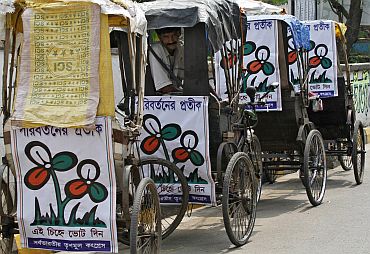
Neerja Chowdhury explains how Mamata Banerjee's challenge, which poses a grave threat to the 34-year old rule of the Communist parties in West Bengal, cannot be ignored.
There's no doubt that elections in every democratic set up have their overarching importance, but the ongoing assembly elections in West Bengal, which kicked off last Monday, possess certain significances that can hardly be ignored.
Coverage: Assembly Elections 2011
The fact that the Election Commission decided to hold elections in six phases in West Bengal, showed that it apprehended violence and did not want to take any chances.
Chief Election Commissioner S Y Quraishi had said weeks before the elections were notified that violence was going to pose the big challenge for the commission in West Bengal. Not surprisingly, the EC wanted to ensure adequate deployment of forces in every area of the state.
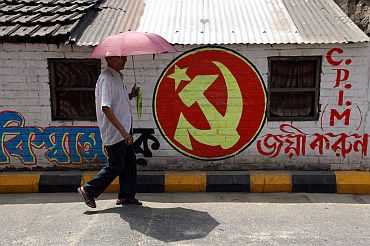
Monday's first phase of polling, in North Bengal, was seen to be particularly critical for the Left Front -- ten of its ministers were in the fray -- which had over the years held sway there.
They were also crucial for the Congress, which has had a presence in three of the six districts which went to the hustings, to come up with a decent tally, out of the 65 seats Mamata Banerjee's Trainamool Congress had left for the party.
Murshidabad, Malda, and Uttar Dinajpur have a heavy concentration of Muslims, and traditionally they have stayed with the Congress.
Any pickings for the Trinamool Congress from the north of the state would be a bonus and offset any unexpected losses in the south, where the 'winds of change' are seen to be blowing.
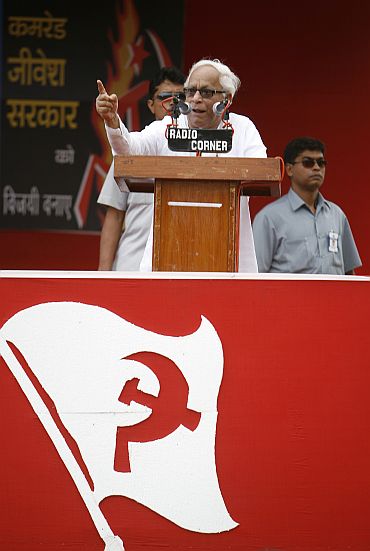
Mamata had reason to be happy with the large voter turnout in the first phase of polling, which she interpreted to be a vote for change.
For all the problems inherent in the Trinamool-Congress alliance -- there are the rebels, and the Congress workers are unhappy that the party high command gave in too easily to Mamata.
This time there is a united opposition against the Left Front government, and even Communist Party of India-Marxist general secretary Prakash Karat conceded this.
It goes without saying whichever side wins will target the cadres of the other side in a battle which has acquired a 'do or die' dimension.
To dislodge the Left Front government, which has won the last seven successive elections, would be nothing less than historic.
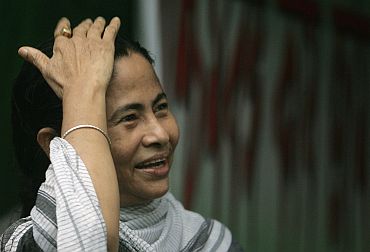
The other significant aspect of the poll is the ascent of Mamata Banerjee who is taking on an entrenched Left Front. She represents the rise of a woman in an otherwise male dominated Indian politics and that too in a large state, which accounts for 42 Lok Sabha seats, though of course it is not as large as Mayawati's Uttar Pradesh.
Mamata's story is of a leader who has risen without godfathers to back her. Nor does she have the advantage of belonging to a political family whose backing would have given her the necessary push in politics.
She has come through the ranks, built her party, steered it through its ups and downs -- only five years ago, in 2006, the Trinamool Congress had managed to get only 30 seats, which is only one tenth the strength of the House -- and not hesitated to take on the cadre-based machinery of the CPI-M in a state known for its political violence.
Mamata had parted company with the Congress in 1997 to form her own party, Trinamool Congress. But over the years, it is the smaller and regional Trinamool Congress which has become the larger party and come to occupy the space that the Congress once held in West Bengal before the Left Front came to power in 1977.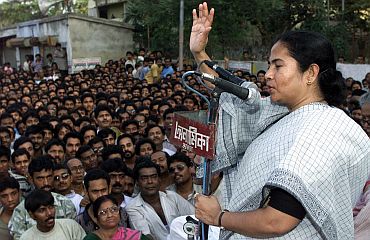
Today Mamata is giving the highly organised Communist parties a run for their money. First she went on to win the local elections in 2008 and then made her mark in the 2009 Lok Sabha poll (getting 19 seats when the CPI-M managed only 9).
She compelled the Congress to accept the number of seats she offered them, leaving them with no other choice but to accept.
Though the Left parties put into place correctives, after Singur and Nandigram, and the Left's defeats in 2009, it remains to be seen whether these remedial acts can withstand the onslaught of a desire for change that has been building up, or whether they have come as 'too little too late'.
This is not to say that Mamata does not have her faults. Or to conclude that she will make a good chief minister, were the alliance to get elected. The popular perception about her is that she is volatile and erratic.
One insight into her style of functioning was her decision not to allow any of her Lok Sabha MPs to get a Cabinet berth at the Centre in the United Progressive Alliance II ministry, even though she had 19 MPs and was the Congress' biggest ally. She obviously did not want anyone even remotely to emerge as another power centre in Delhi.
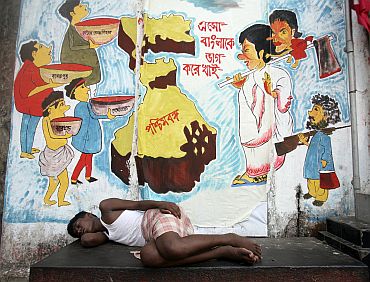
Mamata may well go on to centralise power in her hands. She may well prove to be maverick as a ruler if brought to power, though she has got half a dozen former leading bureaucrats to contest on the Trinamool ticket to counter the criticism that she will not be able to handle the challenges of governance.
But the significance of her rise goes beyond what she does in the future. It is rooted in our democratic setup, however faulty or flawed it is. That someone like Mamata, sporting her bordered white sarees, and rubber chappals, and living in a two room apartment in Kolkata, as she does, without godfathers or a family to back her, can emerge as a political force to take on a 34-years-in-power Left Front government in a violence prone state, is a tribute to our democracy.
The rest of the story will unfold on and after May 13.